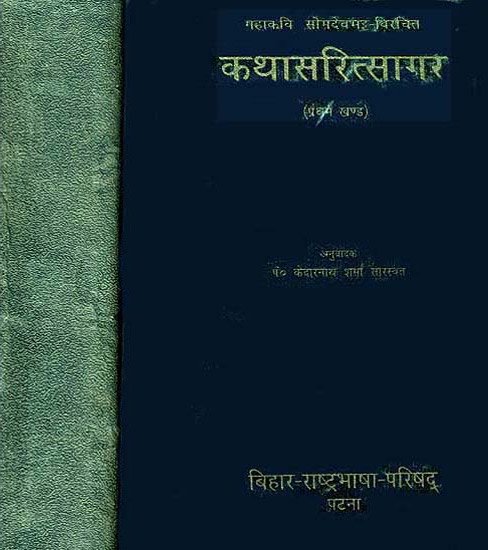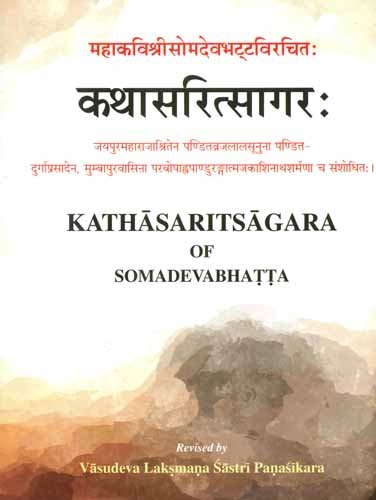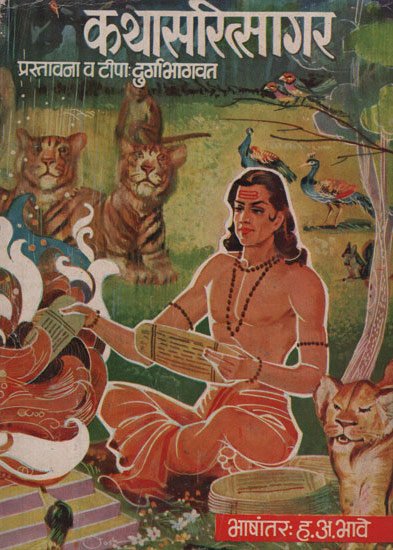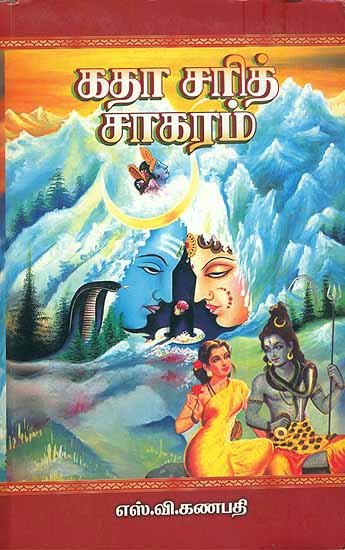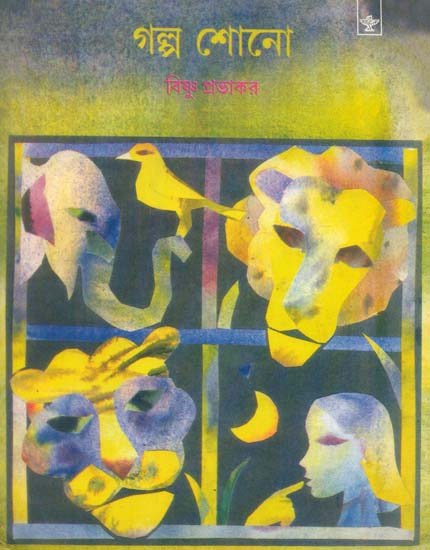Kathasaritsagara [sanskrit]
by C. H. Tawney | 2014 | 226,424 words | ISBN-13: 9789350501351
The Sanskrit edition of the Kathasaritsagara referencing the English translation and grammatical analysis. Written by Somadeva and dating from the 12th century, the Kathasaritsagara (or Katha-sarit-sagara) represents an epic legend narrating the adventures of Naravahanadatta as he strives to become the destined emperor of the Vidyadharas. Alternative titles: (Kathāsaritsāgara, कथासरित्सागर, Kathā-sarit-sāgara)
Verse 1.6.165
अथ तम् अखिलविद्यालाभम् आकर्ण्य राज्ञः प्रमुदितवति राष्ट्रे तत्र को ऽप्युत्सवो ऽभूत् ।
अपि पवनविधूतास्तत्क्षणोल्लास्यमानाः प्रतिवसति पताका बद्धनृत्ता इवासन् ॥ १६५ ॥
atha tam akhilavidyālābham ākarṇya rājñaḥ pramuditavati rāṣṭre tatra ko 'pyutsavo 'bhūt |
api pavanavidhūtāstatkṣaṇollāsyamānāḥ prativasati patākā baddhanṛttā ivāsan || 165 ||
The English translation of Kathasaritsagara Verse 1.6.165 is contained in the book The Ocean of Story by C.H. Tawney. This book is available online or you could buy the latest edition:
Read online Buy now! The English translation by C.H. Tawney (2014)
Glossary of Sanskrit terms
Note: This extracts Sanskrit terms and links to English definitions from the glossary, based on an experimental segmentation of verse (1.6.165). Some terms could be superfluous while some might not be mentioned. Click on the word to show English definitions.
Atha, Akhila, Vidyalabha, Akarnya, Rajan, Pramuditavat, Rashtra, Rashtri, Tatra, Kah, Api, Utsava, Pavana, Vidhuta, Tatkshana, Ullasin, Amana, Prativasati, Pataka, Baddha, Nritta, Iva, Asat,
Analysis of Sanskrit grammar
Note: this is an experimental feature and only shows the first possible analysis of the Sanskrit text (Kathasaritsagara Verse 1.6.165). If the system was successful in segmenting the sentence, you will see of which words it is made up of, generally consisting of Nouns, Pronouns, Verbs, Participles and Indeclinables. Click on the link to show all possible derivations of the word.
- Line 1: “atha tam akhilavidyālābham ākarṇya rājñaḥ pramuditavati rāṣṭre tatra ko 'pyutsavo 'bhūt ”
- atha -
-
atha (indeclinable)[indeclinable]
- tam -
-
ta (noun, masculine)[adverb], [accusative single]ta (noun, neuter)[adverb], [nominative single], [accusative single]tā (noun, feminine)[adverb]tan (noun, masculine)[adverb]sa (noun, masculine)[accusative single]
- akhila -
-
akhila (noun, masculine)[compound], [vocative single]akhila (noun, neuter)[compound], [vocative single]
- vidyālābham -
-
vidyālābha (noun, masculine)[adverb], [accusative single]
- ākarṇya -
-
ākarṇya (noun, masculine)[compound], [vocative single]ākarṇya (noun, neuter)[compound], [vocative single]
- rājñaḥ -
-
rājan (noun, masculine)[accusative plural], [ablative single], [genitive single]
- pramuditavati -
-
pramuditavat (noun, masculine)[locative single]pramuditavat (noun, neuter)[locative single]
- rāṣṭre -
-
rāṣṭra (noun, masculine)[locative single]rāṣṭra (noun, neuter)[nominative dual], [vocative dual], [accusative dual], [locative single]rāṣṭri (noun, feminine)[vocative single]
- tatra -
-
tatra (indeclinable adverb)[indeclinable adverb]tatra (indeclinable correlative)[indeclinable correlative]tatra (indeclinable)[indeclinable]
- ko' -
-
kaḥ (indeclinable interrogative)[indeclinable interrogative]ku (noun, feminine)[vocative single]ka (noun, masculine)[nominative single]kaḥ (pronoun, masculine)[nominative single]
- apyu -
-
api (indeclinable preposition)[indeclinable preposition]ap (noun, neuter)[nominative dual], [vocative dual], [accusative dual], [locative single]
- utsavo' -
-
utsava (noun, masculine)[nominative single]
- abhūt -
-
√bhū (verb class 1)[aorist active third single]
- Line 2: “api pavanavidhūtāstatkṣaṇollāsyamānāḥ prativasati patākā baddhanṛttā ivāsan ”
- api -
-
api (indeclinable preposition)[indeclinable preposition]ap (noun, neuter)[locative single]
- pavana -
-
pavana (noun, masculine)[compound], [vocative single]pavana (noun, neuter)[compound], [vocative single]
- vidhūtās -
-
vidhūta (noun, masculine)[nominative plural], [vocative plural]vidhūtā (noun, feminine)[nominative plural], [vocative plural], [accusative plural]
- tatkṣaṇo -
-
tatkṣaṇa (indeclinable adverb)[indeclinable adverb]tatkṣaṇa (noun, masculine)[compound], [vocative single]
- ullāsya -
-
ullāsin (noun, masculine)[compound], [adverb], [nominative single]ullāsin (noun, neuter)[compound], [adverb], [nominative single], [vocative single], [accusative single]
- amānā -
-
amāna (noun, neuter)[compound], [vocative single]
- aḥ -
-
a (noun, masculine)[nominative single]ṛ (noun, feminine)[vocative single]ṛ (noun, masculine)[vocative single]
- prativasati -
-
prativasati (indeclinable)[indeclinable]
- patākā* -
-
patāka (noun, masculine)[nominative plural], [vocative plural]patākā (noun, feminine)[nominative plural], [vocative plural], [accusative plural]
- baddha -
-
baddha (noun, masculine)[compound], [vocative single]baddha (noun, neuter)[compound], [vocative single]
- nṛttā* -
-
√nṛt -> nṛtta (participle, masculine)[nominative plural from √nṛt class 4 verb], [vocative plural from √nṛt class 4 verb]√nṛt -> nṛttā (participle, feminine)[nominative plural from √nṛt class 4 verb], [vocative plural from √nṛt class 4 verb], [accusative plural from √nṛt class 4 verb]
- ivā -
-
iva (indeclinable adverb)[indeclinable adverb]iva (indeclinable)[indeclinable]
- asan -
-
asat (noun, masculine)[nominative single], [vocative single]
Other editions:
Also see the following editions of the Sanskrit text or (alternative) English translations of the Kathasaritsagara Verse 1.6.165
Kathasaritsagar
by Kedarnath Sharma Saraswat (2005)
The Only Edition with the Sanskrit Text and its Hindi Translation (An Old and Rare Book) Set of 3 Vol.
Buy now!
Kathasaritsagara of Somadeva Bhatta (Sanskrit Text Only)
by Vasudeva Laksmana Sastri (2013)
Katha Sarit Sagar in Marathi
by H. A Bhave (1995)
Set of 5 Volumes; Published by Varada Books, Pune. 2256 pages (Throughout B/W Illustrations).
Buy now!
Katha Sarit Sagara (Tamil)
by S. V. Ganapati (எஸ். வி. கணபதி) (2014)
[கதா சரித் சாகரம்] Published by Alliance Publications.
Buy now!
Galpa Shono
by Abhijit Chattopadhyay (2014)
[গল্প শোনো] Galpa Shono: Bengali Translation of 'Suno Kahani From Katha Sarit Sagar'; 9788126015436; Published by Sahitya Akademi, Delhi.
Buy now!Preview of verse 1.6.165 in Bengali sript:
অথ তম্ অখিলবিদ্যালাভম্ আকর্ণ্য রাজ্ঞঃ প্রমুদিতবতি রাষ্ট্রে তত্র কো ঽপ্যুত্সবো ঽভূত্ ।
অপি পবনবিধূতাস্তত্ক্ষণোল্লাস্যমানাঃ প্রতিবসতি পতাকা বদ্ধনৃত্তা ইবাসন্ ॥ ১৬৫ ॥
![Kathasaritsagara [sanskrit] - book cover](/uploads/a/Katha-Sarit-Sagara.jpg)
